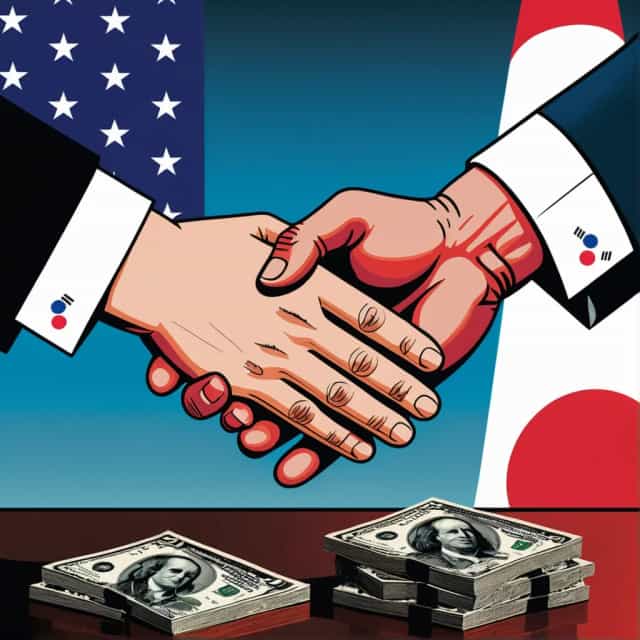
Image source: Block Media
U.S. Treasury Secretary Confident in Resolving $350 Billion U.S.-South Korea Investment Dispute
The U.S. Treasury Secretary, Scott Besant, expressed optimism about resolving the $350 billion investment pledge made by South Korea during critical trade negotiations with the United States. This massive commitment has been a point of contention but now appears closer to resolution. According to Besant, the negotiations are progressing rapidly, with a conclusion anticipated within the next 10 days.
Speaking at a press briefing in Washington, D.C., on October 15, Besant stated, “Ongoing discussions indicate that the conflict surrounding South Korea’s investment commitment is likely to be resolved,” further adding that the Treasury expects tangible outcomes within the specified timeframe. This development signals progress in strengthening economic ties between the two nations.
South Korea’s Pursuit of Unlimited Currency Swap Agreement
South Korea’s request for an unlimited currency swap agreement has sent mixed signals within U.S. financial decision-making circles. Addressing this, Besant stressed that while the currency swap request primarily falls under the purview of the Federal Reserve, he personally supports the idea.
“If I were the Fed Chair, South Korea would already have a currency swap agreement similar to Singapore's,” Besant remarked during the briefing, showing his favorable stance. Still, he refrained from elaborating on why Singapore was used as a comparison.
To provide context, Singapore entered into a $60 billion currency swap agreement with the U.S. Federal Reserve in 2020 to stabilize financial markets during the COVID-19 pandemic. Although Besant acknowledged South Korea's proactive measures to stabilize its foreign exchange market, he stopped short of making commitments on advancing their request for a similar arrangement, leaving the matter solely in the hands of the Federal Reserve.
Federal Reserve Leadership Transition Narrowed to Key Candidates
Besant unveiled key details about the upcoming Federal Reserve leadership transition, revealing that the race for the next Fed Chair has narrowed from 11 candidates to a shortlist of five. He plans to recommend two or three finalists to President Donald Trump by mid-December, with interviews already underway to determine the successor to Jerome Powell, whose term ends in May 2024.
The selection process for the next Fed Chair could have lasting implications for U.S. monetary policy, shaping interest rates, inflation management, and currency stability in the years to come. By identifying the most qualified candidates, Besant aims to ensure continuity and stability in leadership at one of the world's most influential financial institutions.
WTO Legal Challenges and Tariff Strategies
Besant also addressed the ongoing legal battles over mutual trade tariffs currently under review by the U.S. Supreme Court. While acknowledging the potential invalidation of these tariffs, he emphasized the wide range of options available to the United States.
“The U.S. has numerous mechanisms to impose tariffs, even if the Supreme Court overturns the current measures,” Besant noted, highlighting the administration's resolve to defend its trade policies and leverage these tools to create balanced economic agreements with international partners.
Insights on Japan’s Economic Decisions: LNG Imports and Yen Depreciation
Turning to Japan’s economy, Besant commented on two key areas: energy imports and currency dynamics. He remarked that Japan’s efforts to reduce dependency on Russian liquefied natural gas (LNG) align with broader strategic objectives outlined by both nations. The reduction supports geopolitical priorities, particularly in light of heightened tensions surrounding energy security in global markets.
Regarding the yen’s depreciation, Besant suggested that Japan’s central bank must act decisively to address its currency's weakness through "appropriate monetary policies." Weakness in the yen poses risks not only for Japan’s economy but also for broader regional trade stability, potentially adding pressure on policymakers to intervene effectively.
U.S. Economic Strategy Amid Shifting Global Dynamics
Besant’s comments throughout the briefing underscore the Biden administration’s continuing focus on building strategic economic alliances and addressing complex trade and monetary challenges. With geopolitical dynamics evolving at a rapid pace, ongoing negotiations and policy decisions will serve as key pillars for advancing U.S. financial stability and international trade relationships.
Whether resolving South Korea’s investment dispute, evaluating currency swap arrangements, or navigating legal issues surrounding tariffs, these discussions reflect America's commitment to solidifying its position as a global economic leader.










